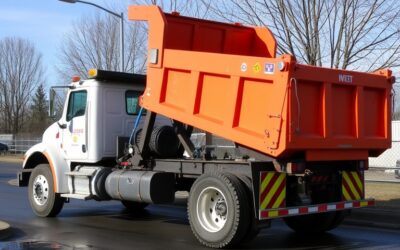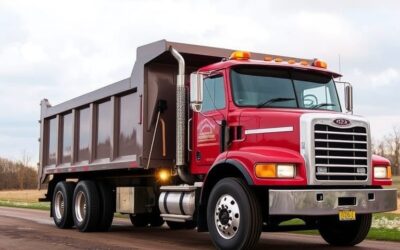Frame type dump trucks are crucial in construction, mining, and other heavy-duty industries. Their robust design allows them to handle heavy loads, making material transportation more efficient and productive.
Despite their sturdy build and versatility, operating frame type dump trucks comes with significant risks that require careful attention to safety protocols. Ensuring the safety of both the operator and others on the job site is paramount.
Accidents involving frame type dump trucks can lead to severe injuries, equipment damage, and costly project delays. Factors such as improper loading, uneven terrain, and mechanical failures can increase the likelihood of tipping over or other dangerous incidents. Therefore, understanding the mechanics and operational demands of these trucks is critical for every driver.
By adhering to essential safety tips and incorporating advanced safety technologies, drivers can significantly reduce the risks associated with operating frame type dump trucks. This guide provides valuable insights and practical advice to help drivers stay safe while maximizing the efficiency and effectiveness of their equipment.
From pre-operation checks to real-time safety enhancements, we cover all the necessary steps drivers need to take to ensure safe and successful operations.
Understanding the Mechanics of Frame Type Dump Trucks
Frame type dump trucks are a mainstay in many heavy-duty sectors. These trucks have a rigid frame that supports the weight of the load and the mechanical components. This makes them incredibly stable and capable of handling substantial weights. The frame type design allows these trucks to efficiently transport materials like sand, gravel, and demolition waste.
The mechanics of these trucks involve several key components. The hydraulic system is crucial as it powers the lifting mechanism that raises the bed to unload materials. This system must be strong enough to lift heavy loads and reliable to prevent malfunctions during operation. Another critical component is the frame itself, which needs to be robust to withstand the stresses of heavy loads and rough terrain.
The tires and suspension system also play a vital role in the truck’s functionality. Properly maintained tires ensure that the truck can handle the load and navigate different terrains without compromising safety.
The suspension system helps absorb shocks from the ground, providing a smoother ride and reducing wear and tear on the vehicle. Understanding these components and how they work together is essential for safe and efficient operation.
Pre-Operation Safety Checks and Inspections
Before operating a frame type dump truck, performing thorough pre-operation safety checks and inspections is crucial. These checks help identify potential issues that could compromise safety and efficiency.
- Hydraulic System: Check the hydraulic system for leaks or damage. Ensure fluid levels are correct and all connections are secure to prevent failures or accidents.
- Tires and Suspension: Check the tires for proper inflation and any signs of wear or damage. Ensure that the suspension system is in good condition to handle the load and provide a stable ride.
- Brakes: Test the brakes to ensure they function properly, and check the pads, discs, and fluid levels. Functional brakes are essential for safe stopping, especially when carrying heavy loads.
- Lights and Signals: Ensure that all lights, indicators, and signals function correctly. Visibility is crucial for safety, especially in low-light or busy job sites.
- Load Distribution: Verify that the load is evenly distributed and adequately secured. Uneven or unsecured loads increase the risk of tipping over or losing control of the vehicle.
- General Inspection: Conduct a general inspection of the truck’s body, frame, and other components for any visible damage or wear. Address any issues before proceeding with operation.
Performing these pre-operation checks can help prevent accidents and mechanical failures, ensuring a safer working environment and more efficient operations.
Safe Driving Practices for Frame Type Dump Truck Drivers
Safe driving practices are crucial for operating frame type dump trucks. Implementing these practices helps minimize the risk of accidents and enhances the efficiency of the operations. Following standard safety guidelines ensures the protection of the driver, the truck, and everyone on the job site.
- Maintain Safe Speeds: Maintain a controlled speed. High speeds reduce reaction time and increase accident risks. Keep speeds low, especially when navigating through busy areas or rough terrain.
- Adhere to Weight Limits: Never exceed the truck’s weight limits. Overloading can strain the vehicle’s components and make it harder to control, leading to tipping or brake failure. Ensure that the load is within the specified limits and balanced properly.
- Use Proper Signaling: Always use turn signals and brake lights to communicate your intentions to other drivers. Clear signaling helps prevent collisions and ensures smooth interactions with other vehicles and equipment on the site.
- Stay Alert and Focused: Avoid distractions while driving. Stay focused and aware of your surroundings to prevent accidents caused by distractions.
- Navigate Hills and Slopes Carefully: When driving on hills or slopes, ensure you ascend or descend at a controlled speed. Use lower gears to maintain control and avoid sudden movements that could destabilize the truck.
- Regular Training: Participate in regular training sessions to stay updated on best practices and new safety protocols. Continuous learning and practice can help enhance your driving skills and safety awareness.
By adhering to these safe driving practices, drivers can significantly reduce the risk of accidents and ensure smooth and efficient operations.
Using Technology to Enhance Safety in Frame Type Dump Trucks
Technology plays a significant role in enhancing the safety of frame type dump trucks. Advanced systems and devices can aid drivers in maintaining stability, monitoring conditions, and making real-time adjustments.
- Anti-Tip Kits: Anti-tip kits prevent rollovers by using sensors to monitor balance and alert drivers of tipping risks. Some systems can automatically adjust the load or truck position to prevent accidents.
- GPS and Tracking Systems: GPS systems help drivers navigate efficiently and avoid hazardous routes. Tracking systems can monitor the truck’s location and status, providing real-time data to fleet managers for better decision-making.
- Telematics: Telematics systems collect and analyze data on truck performance, driver behavior, and road conditions. This information can be used to improve safety measures, schedule maintenance, and train drivers more effectively.
- Dash Cams and Monitoring Systems: Dash cams and in-cab monitoring systems provide visual records of driving conditions and driver actions. These tools can be crucial for analyzing incidents and improving safety protocols.
- Automatic Braking Systems: These systems can detect obstacles and automatically apply the brakes if the driver fails to react in time. This technology helps prevent collisions and enhances overall safety.
- Load Monitoring Systems: Advanced load monitoring systems ensure that the truck’s load is distributed evenly and within safe limits. These systems alert drivers to potential overloading issues, reducing the risk of tipping and mechanical failure.
By integrating these technologies, operators can significantly enhance the safety and efficiency of their frame type dump truck operations.
Safe Operation of Frame Type Dump Trucks
Operating frame type dump trucks safely involves understanding their mechanics, conducting thorough pre-operation inspections, adhering to safe driving practices, and leveraging advanced safety technologies. These steps are essential for minimizing risks and ensuring efficient operations. Recognizing potential tipping hazards and incorporating proactive measures, like anti-tip kits and load monitoring systems, can significantly enhance safety.
Focus, regular training, and using the latest technologies are key to protecting operators and equipment. As we continue to advance in 2024, the emphasis on safety and technology in dump truck operations will only grow more significant.
For more information on how to improve dump truck safety with advanced technologies, visit Wink Anti-Tip. Our construction company safety programs are designed to equip your fleet with the best in safety and efficiency. Contact us today to explore how our anti-tip kits can keep your operations safe and reliable!





